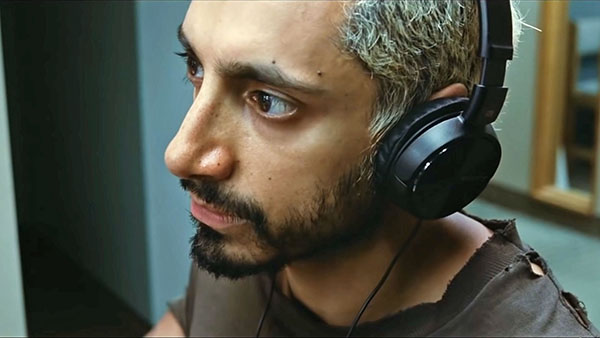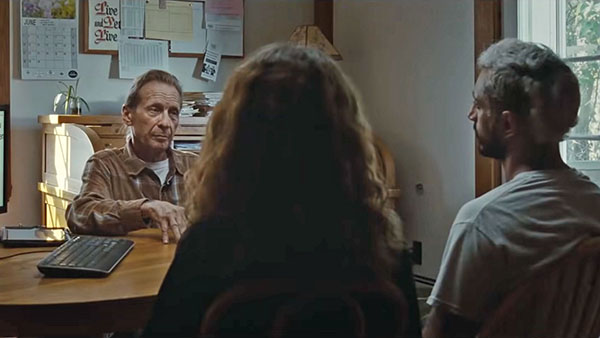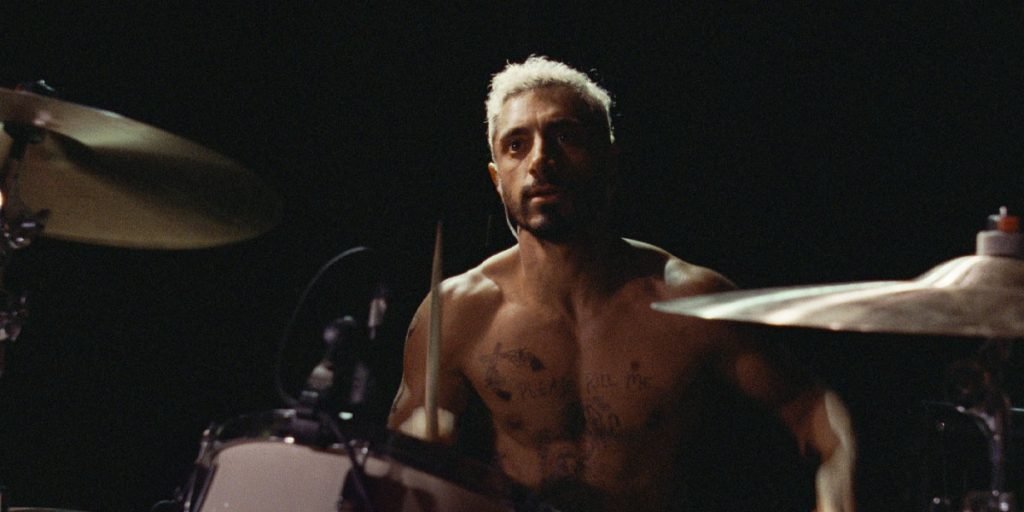Sound of Metal, featuring Riz Ahmed in his best performance to date, tells the story of a drummer’s sudden loss of hearing and the explosive emotional turmoil that follows.
Humans, among countless other biological characteristics, can be defined by the five senses. We all know what they are – we learned them in early childhood. Admittedly, a source of great anxiety for me as a kid was the fear of not being able to remember one of these five senses in some life or death interrogatory scenario. Given the grave importance of understanding the senses instilled by my teachers and elders, I only assumed there must be some periodic checkpoint of basic human trivia, wherein accurate recall of the five senses would surely be worth at least 30% of the grade. I obviously do not need to tell you how wrong I was.
Despite my childhood anxiety, the corroboration of which I do not need given its sheer embarrassment, I still know today that sound, the ability to hear, is one of those senses that, for many, we are born with and naturally maintain throughout our lives. Sound of Metal, the debut film from director Darius Marder, concerns Ruben (Riz Ahmed), the percussive half of a post-hardcore experimental music duo, and the terrifying first steps of his journey into the sudden loss of his sense of sound. It’s a film about love, and drive, and the special brand of communicativity some, like Ruben, believe only art and what-you’re-good-at can achieve. And then it’s a film about what happens when all of those things are suddenly taken away.
Ruben and his bandmate/girlfriend Lou (Olivia Cooke, who makes the most of what little screen time she’s got – no surprise there from a consistently terrific performer) have their lives and career stopped dead in their tracks when it becomes abundantly clear that his inability to hear a single thing, much less accurately keep time with her in concert, warrants rehabilitation. I use the term rehabilitation specifically, because it stands to mention that Ruben is an addict. There are seldom exterior sequences in Sound of Metal during which he isn’t feverishly sucking down a cigarette, and eventually we learn that Ruben was previously involved with every drug under the sun, specifically heroin. Despite his four year sobriety from drugs, Ruben’s addictive tendencies are front and center, and it’s Riz Ahmed’s skill as the best actor of his generation (quote me on that) which skyrockets the character and the film to atmospheric levels of brilliance.

Term the addiction however you like: music, art, love, adrenaline, perfection, security, success – whatever it is, he needs it, and the fact that he can’t have it, because he’s been stripped of what he presumed to be an inalienable right of biology, absolutely murders him to the core. As Ruben, Riz Ahmed is ballistic, magnetic, unhinged. But he’s also tender, disciplined, and kind. Ruben is a soft boiled egg on a fancy dish in a Frenchman’s kitchen. Hard on the outside, soft on the inside, and the only way in is to fracture the exterior. Riz Ahmed’s is the kind of performance I like to call acting without a net: gutting, blistering, often terrifying, grounded in thematic truth and technical effortlessness. His excellence lies in the fact that you’ll never catch him acting; you’re never watching Riz Ahmed act. It’s the kind of tour de force unsuspecting folks living under a rock will look at and say, “Why haven’t I seen this guy before?” You have.
From projects as delightfully obscure as Four Lions, to as strange and mighty as Nightcrawler, as critically lauded as The Night Of (for which he won an Emmy), to as enormous and Disney-fied as Rogue One, Riz Ahmed has been patiently building his career rooted in impeccability when it comes to the notion of picking the right projects. In Sound of Metal, he turns in his best performance to date, and surely the one we’ll look at down the road and say, “Oh yeah, that was the last time anyone could even pretend to ignore this guy.”
His Ruben is never not at war with himself, rabidly carving out pieces of his own soul in hopes of finding something– anything– buried underneath that he can use to his advantage. Whatever the method, whatever the cost, Ruben has to get better, because he knows this is not who he really is. He’s not deaf, couldn’t be him, it’s not what he’s meant to be. He can’t sit still, he can’t not think out loud, he’s frenetic, impatient, he’s gotta get his shit together because that’s what he’s supposed to do. He remarks at one point, “No one else is gonna save my life, right?” He knows he has a problem, but it’s not really a problem, it’s totally under control and he’s got this. He just needs a little time, a little money, a little faith. Just trust him. He will not submit to the silence. Ruben is an addict. Enter Paul Raci.
Lou finds Ruben a sort of refuge and rehabilitation facility in the form of what feels like a kind-hearted commune. It’s a community of deaf and hearing-impaired individuals that, like Ruben, are struggling or have struggled with behavioral issues on top of their deafness. Paul Raci plays Joe, the operator and director of this wellness community, and it’s through him, chiefly as a foil and mirror to Ruben the addict, that the heartbreak train chugga-chugga-choo-choo’s its devastating way down the tracks with resolute ferocity.
Paul Raci gives Riz Ahmed a performative run for his money. I’m not sure if anyone already has this job but, if they don’t, I’d personally like to throw my hat in the ring for manager of the Paul Raci Oscar Nomination Campaign. His quiet, measured devastation is enough to bring even the stone-coldest moviegoer to their knees, and launches Sound of Metal to entirely new heights of poignancy and ruin. His words, his expressions, his gestures, his thoughts, his heart – they’re all on the table for anyone to see, but so brilliantly calculated, thoughtfully chosen, and steeped in a lifetime of trauma, loss, grief, grit, and resilience.
There’s a scene about two-thirds of the way through Sound of Metal where Ruben and Joe sit at a table and have a conversation. I won’t give any particulars away. Ruben asks for something. Joe says no. The directive of the scene is simple, but it’s one of the most complicated, layered, and outstandingly written and performed scenes in recent memory. (As much as I love going to the movies, and lament the current state of movie-going in today’s climate, I had the pleasure of viewing Sound of Metal via a digital screener, which afforded me the ability to rewind this scene a total of four times. You’ll know it when you see it.) It’s my favorite scene of any film I’ve seen this year, and I’ll be shocked if Sound of Metal itself doesn’t remain near the top of my 2020 list come year’s end.

On the technical side of things, get ready to hear a lot about the film’s sound, over and over again, and rightfully so. Sound designer Nicolas Becker’s achievement is a marvel, the quality of which demands to be experienced on the largest screen with the best speakers possible. That may be presently difficult or even impossible for some, so a home television or device will suffice, especially in service of the fact that this film as a whole is not to be missed. The sound work certainly won’t go unnoticed on a smaller scale, but it surely deserves the platform of a proper cinema. Either way, what Becker and his team have accomplished will be cemented as a metric that students of sound design and professional contemporaries alike will look to as a standard of excellence in the craft.
This is a film about connectivity, and void, and self-worth, and self-reliance. It’s about silence in a noisy world, acceptance in a silent world, and the unappealable dispossession of who we thought we were and how we choose to cope. It’s about what it means to be needed, and wanted, and if you ever stop to consider whether you even need or want yourself. It’s a film that takes no prisoners in its provocation of frustration: you feel for Ruben, you’re on edge with Ruben, your heart breaks for Ruben. It’s about the deeply transformative nature of being human, beauty and ugliness in equal measure. It’s about the hole left by something you thought would never leave you, and the ensuing process of grief with which you have no choice but to make peace. It’s about what happens when, despite how fiercely you were instructed to learn your name, your birthday, to decide what you like, what you don’t like, what color a soft boiled egg is, what taste it has, what sound it makes when you crack the shell– how unapologetically it can all be taken away and leave your soul for dead. It’s about rebirth.
In the end, Sound of Metal and its protagonist don’t end up far from where they began. It’s not concerned with redemption in a big, showy way. There are no sweeping Spielbergian triumphs of the human spirit to be had here. No swelling of the orchestra nor soapbox monologue through which the entire tale is recounted and spoon fed to the audience in an attempt to tie a pretty ribbon around everything. Ruben’s soul is broken in two, or three, or maybe a million, and so, now, is yours. His path forward is one he must painstakingly pave for himself, and the sooner he learns to let go – of his past, his doubts, his fears, his hopes, his ghosts – the sooner he’ll understand, despite everything he’s learned about himself and his world up until this point, what it means to be alive and appreciate the unmatched, unsung beauty of silence.
Sound of Metal is now available to watch on digital and on demand.

